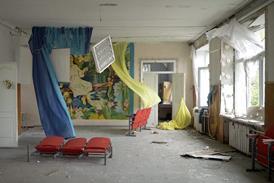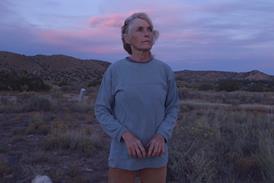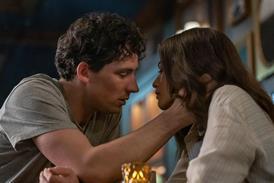Dir: Richard Roxburgh. 104mins. Aus. 2007.
The directorial debut from Australian actor Richard Roxburgh (Moulin Rouge, Van Helsing), Romulus, My Father boasts strong performances, elegant camerawork and striking early 1960s production design. But it's a tough working-class tale that grows ever more harrowing as it intensifies and, despite the formidable presence of Eric Bana in the title role, will remain strictly an arthouse item after its May 31 release in Australia. The combination of star and vivid country locations will doubtless ensure it attracts international festival attention.
Nick Drake's sparsely powerful screenplay is mined from the 1998 memoir of philosopher Raimond Gaita, who emigrated to Australia in 1950 at the age of four with his Romanian-born father Romulus and German-born mother Christina.
As dirt-poor 'new Australians', the alien family settle in rural Victoria where Romulus (a permanently unshaven Bana) works all-hours as a blacksmith and craftsman in ironwork while Christina (Potente) goes unquietly crazy. The movie sees the world from young Raimond's (Smit-McPhee) uncomprehending point of view and director Roxburgh allows his audience to make connections and conclusions as the boy matures and gains understanding.
Christina is a delicious mystery to her son: she smothers him with love and affection, but then disappears to Melbourne for long periods to be with her husband's former comrade. Romulus himself is the epitome of hard working, honest manliness, a heroic father figure, yet with a frightening streak of recklessness and growing desolation. Raimond has to cope with an ever-darkening adult world of jealousy, dangerous passions, despair and encroaching madness, even multiple suicides.
There's an idyllic view of the boy's life to begin, with elderly neighbours baking him scones and the local tramp teaching him how to boil eggs in a tin of urine. To say that the narrative soon darkens is an understatement, for Raimond suffers a harrowing succession of blows that eventually leaves the audience reeling. The Gaita memoir was noted for its sombre lyricism, for the constraint and understatement by which terrible events are narrated.
But full-blooded acting from an expert cast (particularly Potente as the hot/cold, chronically unfaithful mother) make dramatic understatement impossible on-screen. As ghastly events accumulate, so the boy's plight begins to harrow and melodrama looms.
Eric Bana is muscular and rock solid as the good father struggling against hard times and a gutting marriage, though his descent into mental turmoil seems unprepared and comes too suddenly. Kodi Smit-McPhee is an expressive and sensitive young actor but too beautiful and well-spoken to fully convince as a country ragamuffin from Romania with few English-speaking contacts.
Roxburgh and his distinguished cinematographer Simpson (Shine, Oscar & Lucinda, Under the Tuscan Sun) maintain an impressive classic style with many a potent image. A lonely, forlorn Raimond perches on the prow of high tin roof waiting for his father to return along the country road as fierce sunlight morphs into star-strewn darkness.
Always impressive to watch, the feature delights in its precise 1960-62 period details of settings and costumes, both in country Victoria and in depressed, low-rent suburban Melbourne. The atmospheric music by Basil Hogios is elegantly simple.
Production companies/backers
Pick Up Truck Pictures
Film Finance Corporation Australia
NSW Film & Television Office
Arena Films
Australia distribution
Dendy Films
International sales
Arclight Films
Producers
Robert Connolly
John Maynard
Executive producers
Andrew Myer
Gary Hamilton
Victor Syrmis
Screenplay
Nick Drake, based on the memoir by Raimond Gaita
Cinematography
Geoffrey Simpson
Editor
Suresh Ayyar
Music
Basil Hogios
Main cast
Eric Bana
Franka Potente
Marton Csokas
Kodi Smit-McPhee
Russell Dykstra
Jacek Koman


















No comments yet